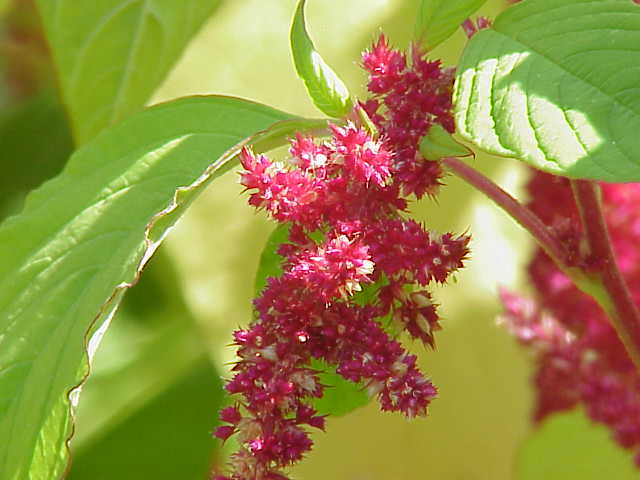Common Names and Other Names:
- Amaranth
- Pigweed
- Redroot
- Love-Lies-Bleeding
- Prince’s Feather
- Chinese Spinach
- Callaloo (in Caribbean cuisine)
Where Does It Occur:
Amaranth refers to a group of plants belonging to the genus Amaranthus, which includes over 60 species. These plants are native to:
- Central and South America: Particularly Mexico and Peru
They have been naturalized and cultivated worldwide, now found in:
- North America
- Europe
- Africa
- Asia
- Australia
Amaranth thrives in:
- Temperate and Tropical Climates
- Varied Soils: From rich, fertile soils to poor, disturbed soils
- Agricultural Fields
- Gardens
- Roadsides
- Waste Areas
Some species are cultivated for their edible leaves and seeds, while others are considered weeds.
Basic Ingredients (Constituents):
Amaranth is rich in nutrients and bioactive compounds:
- Proteins:
- High-quality plant-based protein with all essential amino acids, including lysine
- Vitamins:
- Vitamin A (Beta-Carotene)
- Vitamin C
- Vitamin K
- B Vitamins: B2 (Riboflavin), B6 (Pyridoxine), B9 (Folate)
- Minerals:
- Calcium
- Iron
- Magnesium
- Phosphorus
- Potassium
- Zinc
- Manganese
- Dietary Fiber:
- Both soluble and insoluble fiber
- Antioxidants:
- Phenolic Compounds
- Flavonoids
- Squalene
- Lipids:
- Contains unsaturated fatty acids, including linoleic acid
- Phytosterols:
- May help lower cholesterol levels
Most Commonly Used For Treatment Of:
- Nutritional Support:
- Protein Source: Beneficial for vegetarians and vegans
- Iron Supplementation: Helps prevent iron-deficiency anemia
- Digestive Health:
- Fiber Content: Promotes healthy digestion and regular bowel movements
- Heart Health:
- Cholesterol Management: May help reduce LDL (bad) cholesterol levels
- Blood Pressure Regulation: Potassium and magnesium support cardiovascular health
- Antioxidant Effects:
- Oxidative Stress Reduction: Antioxidants protect against cellular damage
- Anti-inflammatory Effects:
- May help reduce inflammation associated with chronic diseases
- Blood Sugar Control:
- Low Glycemic Index: May help stabilize blood sugar levels
- Bone Health:
- Calcium and Magnesium: Support bone density and strength
- Immune System Support:
- Vitamins and Minerals: Enhance immune function
Side Effects:
Amaranth is generally safe when consumed as food, but potential side effects may include:
- Allergic Reactions:
- Rare but may include itching, rash, or gastrointestinal discomfort
- Oxalate Content:
- High levels of oxalates in leaves may contribute to kidney stone formation in susceptible individuals
- Antinutritional Factors:
- Phytic Acid: May reduce mineral absorption; soaking or cooking can reduce levels
- Nitrate Content:
- Leaves may accumulate nitrates, which can be problematic in large amounts, especially for infants
- Gastrointestinal Issues:
- Excessive consumption may lead to bloating or gas due to high fiber content
Available Forms in the Market:
- Grains (Seeds):
- Used like cereals; cooked for porridge, pilafs, or added to soups and stews
- Amaranth Flour:
- Gluten-free alternative for baking bread, pastries, and pancakes
- Amaranth Leaves:
- Consumed as leafy vegetables; cooked like spinach or added to salads
- Supplements:
- Capsules or Tablets: Contain amaranth extracts (less common)
- Amaranth Oil:
- Extracted from seeds; used in skincare products or as a dietary supplement
- Food Products:
- Popped Amaranth: Used in snacks, cereals, and energy bars
- Amaranth-based Pastas and Noodles
Research and Results:
- Cholesterol Reduction:
- Study: “Effect of amaranth grain consumption on cardiovascular risk factors in patients with coronary heart disease.”
- Findings: Showed a reduction in total cholesterol, LDL cholesterol, and triglycerides.
- Reference: Lipids in Health and Disease
- Antioxidant Properties:
- Study: “Antioxidant activity of amaranth extracts.”
- Findings: Demonstrated significant antioxidant activity due to phenolic compounds.
- Reference: Food Chemistry
- Anti-inflammatory Effects:
- Study: “Amaranth protein inhibits inflammation in vitro and in vivo.”
- Findings: Reduced inflammatory markers in animal models.
- Reference: Journal of Food Science
- Anticancer Potential:
- Study: “Squalene from amaranth oil exhibits antitumor properties.”
- Findings: Showed potential anticancer effects in laboratory studies.
- Reference: Cancer Biology & Therapy
- Blood Sugar Control:
- Study: “Amaranth consumption improves glucose metabolism.”
- Findings: Improved insulin sensitivity in animal studies.
- Reference: Journal of Medicinal Food
Note: While these studies are promising, more clinical research in humans is needed to confirm these benefits.
Precautions:
- Kidney Stones:
- Oxalate Content: Individuals prone to kidney stones should consume amaranth leaves in moderation.
- Allergies:
- Cross-Reactivity: Those allergic to related plants should exercise caution.
- Antinutrients:
- Phytic Acid: Soaking, sprouting, or fermenting grains can reduce phytic acid levels, improving mineral absorption.
- Nitrate Levels:
- Caution for Infants: High nitrate levels in leaves may not be suitable for infants; avoid feeding large amounts to young children.
- Pregnancy and Breastfeeding:
- Generally Safe: When consumed as part of a normal diet; consult a healthcare provider before taking supplements.
- Medication Interactions:
- Monitor Blood Sugar: Diabetics should be aware of potential effects on glucose levels.
- Blood Pressure Medications: Potassium content may interact with certain medications; consult a healthcare provider.
Conclusion:
Amaranth (Amaranthus spp.) is a nutritious plant valued for its edible seeds and leaves, offering a range of health benefits due to its rich content of proteins, vitamins, minerals, and antioxidants. Incorporating amaranth into your diet may support heart health, digestion, and overall well-being.
Recommendations:
- Culinary Use:
- Include amaranth grains and leaves in meals as part of a balanced diet.
- Preparation Tips:
- Grains: Rinse thoroughly and cook with adequate water; can be combined with other grains.
- Leaves: Cook properly to reduce oxalate and nitrate content.
- Consult a Healthcare Professional:
- Before using amaranth supplements, especially if you have underlying health conditions or are taking medications.
- Quality Products:
- Choose reputable sources to ensure safety and purity.
Disclaimer:
This information is intended for educational purposes and should not replace professional medical advice. Always consult a qualified healthcare provider for personalized guidance before using amaranth for medicinal purposes.
« Back to Glossary Index